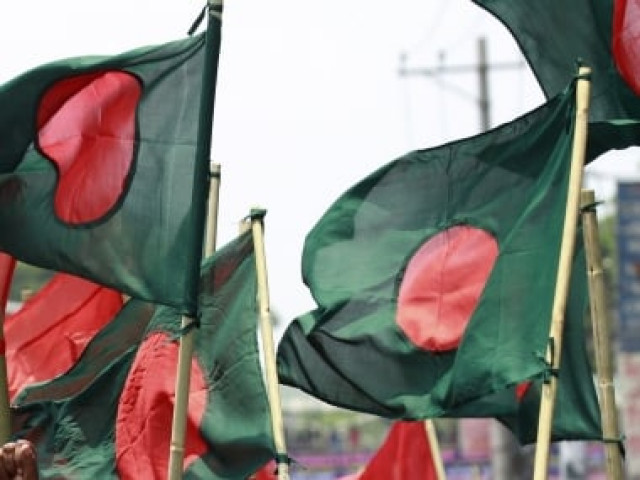Dhaka hangs JI financer for war crimes
Pakistan, Amnesty International condemn Mir Quasem Ali’s execution

Protesters march with national flags as they shout slogans during a Labour Day rally in Dhaka May 1, 2014. PHOTO: REUTERS
Mir Quasem Ali, 63, a key financier of the party, was executed at Kashimpur Central Jail on the outskirts of the capital under charges of murder, confinement, torture and incitement to religious hatred during the war.
Hindu monastery worker hacked to death in Bangladesh
The execution took place amid a spate of militant attacks in the country, the most serious on July 1, when gunmen stormed a cafe in Dhaka’s diplomatic quarter and killed 20 hostages, most of them foreigners.
The war crimes tribunal set up by Prime Minister Sheikh Hasina in 2010 has sparked violence and drawn criticism from opposition politicians, who say it is targeting her political foes. The government denies the accusations. Human rights groups say the tribunal’s procedures fall short of international standards, but the government rejects that assertion, and the trials are supported by many Bangladeshis. Thousands of extra police and border guards were deployed in Dhaka and other major cities.
Previous convictions and executions have triggered violence that has killed about 200 people, most of them Islamist party activists, and police. Since December 2013, five JI leaders, including former top leader Motiur Rahman Nizami, and a leader of the main opposition party, have been executed for war crimes. JI denies its leaders committed any atrocities.
Hindu priest slaughtered in western Bangladesh: police
Pakistan offers condolences
Pakistan expressed ‘deep sadness’ over Quasem’s execution, calling the judicial process which led to him being sentenced ‘flawed’.
“Pakistan is deeply saddened over the execution of the prominent leader of Jamaat-e-Islami Bangladesh, Mir Quasem Ali, through a flawed judicial process,” a foreign ministry statement said. “The act of suppressing the Opposition, through flawed trials, is completely against the spirit of democracy. Ever since the beginning of the trials, several international organisations, human rights groups, and international legal figures have raised objections to the court proceedings, especially regarding fairness and transparency, as well as harassment of lawyers and witnesses representing the accused,” it read.
“The government of Bangladesh should uphold its commitment, as per the Tripartite Agreement of 1974, wherein it decided not to proceed with the trials as an act of clemency. Recriminations for political gains are counterproductive. Pakistan believes that matters should be addressed with a forward looking approach in the noble spirit of reconciliation. Pakistan offers deepest condolences to the bereaved family members,” the statement added.
Fourth ‘Islamist’ militant shot dead in Bangladesh
Amnesty opposes the execution
Amnesty International too condemned Quasem’s execution in a statement issued on Saturday.
“The execution of Mir Quasem Ali, following a trial whose fairness was questioned by the UN, will not deliver justice to the people of Bangladesh… It is a cruel and irreversible punishment that most of the world’s countries have now rid themselves of,” said Champa Patel, Amnesty International’s South Asia Director.
Published in The Express Tribune, September 4th, 2016.



















COMMENTS
Comments are moderated and generally will be posted if they are on-topic and not abusive.
For more information, please see our Comments FAQ